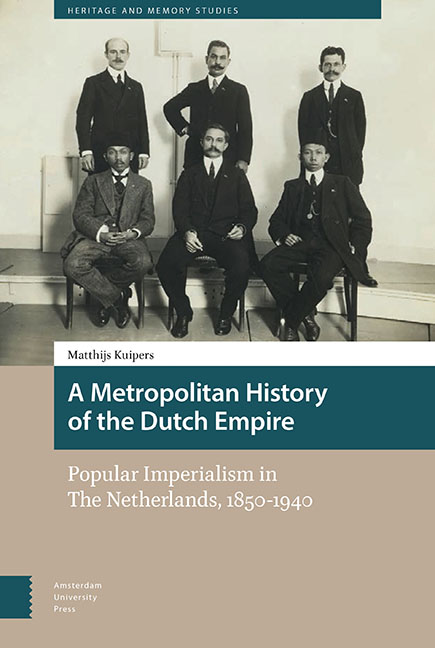Book contents
- Frontmatter
- Contents
- List of Figures and Tables
- List of Abbreviations
- On Names and Terminology
- Introduction: The Still Waters of Empire Run Deep
- 1 Food and Indifference: A Cultural History of the Rijsttafel in the Netherlands
- 2 Indonesians and Cultural Citizenship: The Metropolitan Microcosm of Empire
- 3 Schools and Propaganda: History Books and Schools as Sites of Imperial Campaigns
- 4 Scouting and the Racialized Other: Imperial Tropes in the Dutch Scouting Movement
- 5 Missionary Organizations and the Metropolitan Public: The ‘Inner Mission’ and the Invention of Mission Festivals
- Conclusion: A Fragmented Empire
- Sources
- Index
5 - Missionary Organizations and the Metropolitan Public: The ‘Inner Mission’ and the Invention of Mission Festivals
Published online by Cambridge University Press: 06 May 2022
- Frontmatter
- Contents
- List of Figures and Tables
- List of Abbreviations
- On Names and Terminology
- Introduction: The Still Waters of Empire Run Deep
- 1 Food and Indifference: A Cultural History of the Rijsttafel in the Netherlands
- 2 Indonesians and Cultural Citizenship: The Metropolitan Microcosm of Empire
- 3 Schools and Propaganda: History Books and Schools as Sites of Imperial Campaigns
- 4 Scouting and the Racialized Other: Imperial Tropes in the Dutch Scouting Movement
- 5 Missionary Organizations and the Metropolitan Public: The ‘Inner Mission’ and the Invention of Mission Festivals
- Conclusion: A Fragmented Empire
- Sources
- Index
Summary
Abstract
From the 1860s onwards, annual mission festivals (Zendingsdagen) in the Netherlands attracted thousands of visitors. These highly successful festivals were mass events, attracting police attention and derision from Christian hardliners who believed the events to be too frivolous, and, perhaps most importantly, instrumental in cultivating a metropolitan missionary public. As such, these events were as much a ‘core business’ for missionary organizations as actually proselytizing colonial subjects, and created what Catherine Hall called a public of ‘civilizing subjects’ who were rallied to the cause of empire.
Keywords: mission, civilizing subjects, zendingsfeesten, NZG
By the 1860s, the annual meetings of the Zeister Zendelingsgenootschap (ZZG, Zeist Missionary Society) had evolved into much more than just a meeting where the society's formalities where rushed through. The ‘mission days’ (Zendingsdagen), as they were called, attracted around 2000 people to the small village of Zeist, most of whom would arrive by train. They would spend the day attending a service, receive updates from the foreign missionary front, enjoy each other's company, listen to ‘edifying music’ and take hikes in the surrounding forests. For these numerous visitors, it must have been an enjoyable day. For the conveners, the local Moravian church (Broedergemeente or Hernhutters), on the other hand, it was burden as they experienced difficulties in handling this number of people. One of the loyal visitors, the Harderwijk-based pastor Simon Hendrik Buytendijk, would later recall it in this way: ‘The congregation appreciated the visitors, but we should remind ourselves that good things can also come in abundance. […] To avoid the hustle during the evening sermon, I went for a walk instead. I ran into some Moravian nuns, and they expressed their lament.’ As we will later see, this experience was the incentive for Buytendijk to take the concept of mission days to the next level. The next year he organized a mission festival (Zendingsfeest), which attracted a crowd three times as large as the meetings in Zeist. It was the start of a tradition spanning decades.
The early 1860s witnessed popular demand for mission days and festivals. Apparently, there was such a thing as a missionary public: a public that showed interest in the mission and whose existence was not orchestrated top-down, as the Moravian congregation barely advertised their meetings.
- Type
- Chapter
- Information
- A Metropolitan History of the Dutch EmpirePopular Imperialism in the Netherlands, 1850-1940, pp. 179 - 210Publisher: Amsterdam University PressPrint publication year: 2022



